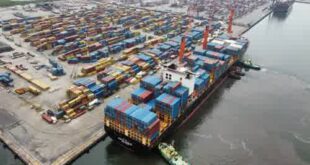By Tunde Uchegbuo
Nigerians who depend on daily activities for livelihood could rebel if the lock down bites harder.
The executive director of Social Action, Ken Henshew, gave this indication recently on a radio programme in Port Harcourt, while appraising efforts by the federal and state governments to fight the coronavirus pandemic.
He noted that the extension of the lockdown in some parts of the country was worth the pains if the spread of the virus must be contained, but warned that the masses could revolt if there is nothing to cushion the effect of the lock down.
“About 80% of Nigerians depend on daily activities for their income. This sect of people may rebel if nothing happens.”
He expressed sadness over the manner the Federal Government is handling the distribution of palliatives to the masses.
Henshaw also maintained that most state governors in Nigeria cannot pay their workers if the price of oil remains low for a long time because the states are not self-sustaining.
“Most states in Nigeria cannot survive. States will owe salaries if the price of oil remains low for a long time because the states rely on allocations from the federation account.”
He asserted that most of the governors are not innovative, insisting that the 13% derivation to oil producing states have been badly managed by successive governments in those states.
But despite the nation’s porous borders and ailing heath facilities, he praised the government for successfully keeping the number of infected persons low, compared to other countries.
He described efforts by Rivers State government to fight the COVID-19 as appreciatively effective, pointing out that the restriction of movements in and out of the state greatly helped to curtail the spread.
He observed that the social distancing directive has not been effective as buses still carry four passengers in a row, while majority of the residents ignore warnings from medical experts.
Henshaw further criticized governors of the Niger delta states for poor policies and framework that would encourage large scale farming to boost food sufficiency in the region.
He observed that Rivers State depends largely on food from Northern Nigeria, noting that the BRACED Commission was in comatose, and had failed to come up with development blueprint that would drive the economy of the region.
Revitalizing the agricultural sector, Henshaw suggested, would help to improve food supply because it is vital for human existence, and is also the largest employer of labour.
He decried the small scale farming that is practiced in the region, pointing out that such could barely meet the food needs of two states, let alone make significant impact in the global markets.
 PH Mundial – Port Harcourt Online Newspaper News Across The Region
PH Mundial – Port Harcourt Online Newspaper News Across The Region


